With six weeks left until the end of the legislative session, Hochul is already looking ahead, insisting that she will work with Senate and Assembly leaders to address New York’s shortage of affordable homes—a conversation that could carry over into next year.
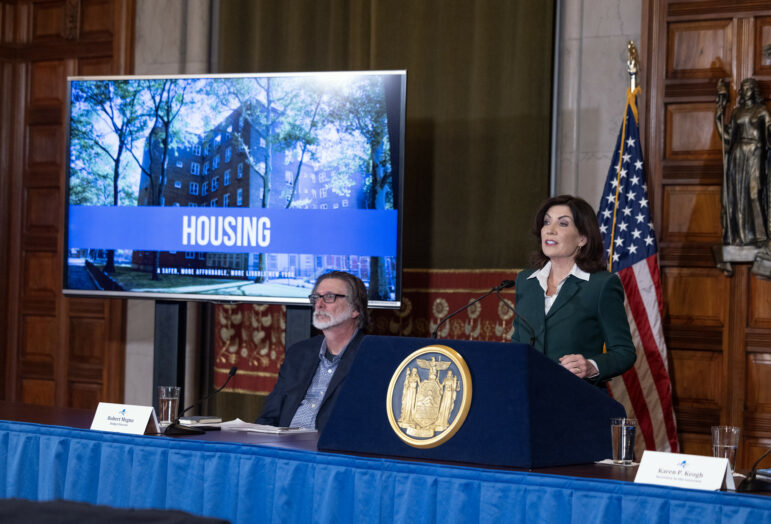
Announcing the outline of an agreement for her historically late $229 billion state budget in Albany on Thursday night, Gov. Kathy Hochul discussed a laundry list of topics before touching on housing—from public safety, to reproductive rights to education.
It was the area of housing policy, she eventually explained, where she and the legislature reached an impasse, despite a statewide dearth of affordable homes. They could agree on nearly $400 million to cover unfunded pandemic rental assistance applications for public housing residents and voucher holders, but not much else.
“I believe major action is required to meet the scale of this crisis,” she said. “The legislature saw it differently. They’re not ready to commit to the kind of transformative change I proposed.”
Hochul’s signature proposal to double New York’s housing supply over the coming decade by requiring localities to boost construction or face zoning overrides hit a brick wall, in the form of staunch opposition from Democrats in the outer boroughs and near-city suburbs.
At the same time, the governor refused to entertain legislation backed by her party’s left flank to curtail evictions without good cause across more than a million households statewide. The bill is a third rail for developers, who say new regulation will only deter much needed construction.
First introduced in 2019, the good cause legislation would prevent landlords from evicting tenants without establishing a cause, such as failure to pay rent or nuisance behavior. It would also allow tenants to challenge rent increases above a certain level—either 3 percent in a year, or 1.5 times the change in the consumer price index.
A proposed rental subsidy modeled after the federal Section 8 program—with rare crossover support among tenants and landlords—also floundered. The governor’s team was concerned about the “long-term fiscal implications” of the initiative, called the Housing Access Voucher Program (HAVP), said sponsor and Senate Housing Chair Brian Kavanagh, calling the outcome a “major disappointment.”
As of Friday morning, budget bills had yet to materialize. Kavanagh said he is still optimistic about inking some smaller housing-related investments, including funding for the statewide anti-foreclosure Homeowner Protection Program and attorneys struggling to keep up with caseloads in housing court.
But with six weeks left until the end of the legislative session, Hochul is already looking ahead, insisting that she will work with Senate and Assembly leaders to address New York’s shortage of affordable homes on the policy front—a conversation that could carry over into next year.
She named a smattering of proposals that would impact New York City, such as removing a floor-area-ratio cap to allow for more dense residential buildings in New York City and a new tax incentive to spur development, as well as a continued push for development in the suburbs.
“We’re going to take the time necessary to talk about other ways that we can make sure that we are building housing stock,” she said. “[We’re] looking at the suburbs, we’re going to talk about our transit hubs, and find a path forward. Because we’re not surrendering on this issue.”
The governor said she also plans to take executive action to further housing goals in the coming weeks, but did not provide any details.
Andrew Fine, policy director of the pro-development group Open New York, said he’d like to see the Metropolitan Transportation Authority (MTA) instigate dense housing projects on the limited land that it owns around train stations.
“There are things [Hochul] can do without the legislature, but long-term there has to be a reckoning on this, and that will likely take legislation next year,” he said.
How much Hochul and the legislature can accomplish in the coming weeks remains to be seen. One source familiar with budget negotiations said that New York City developers were agnostic about Hochul’s vision to increase development in the suburbs, which did little to help its chances: “You didn’t have anybody who was really supportive.”
The same developers remain adamantly opposed to good cause, the source said, having urged Hochul to put forward a suite of pro-tenant alternatives including $250 million for rental vouchers and language to prevent rental price gouging—offers the legislature rejected.
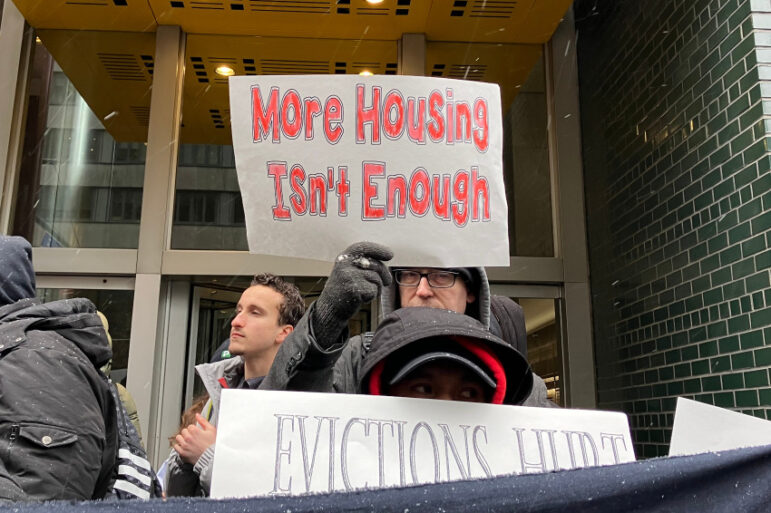
Emma Whitford
Tenant advocates at a rally outside Gov. Hochul’s office in March.Cea Weaver, campaign coordinator for the tenant coalition Housing Justice for All, said the statewide group is skeptical of Hochul’s support for HAVP, the voucher program.
“We have very minimal confidence that… the governor took it seriously, and we didn’t think HAVP without good cause would be nearly as impactful,” Weaver told City Limits. “We have all these concerns that forcing the governor to do a voucher program will lead to a bad voucher program because it requires so much implementation.”
Whether good cause legislation gains traction at the end of session could hinge on who makes the first move, Weaver added. If the governor leads with executive actions, good cause won’t be in the cards. But it may be a different story if the legislature comes out in front with an omnibus proposal.
“It’s not like we have any illusions about her opposition, but the legislature is also saying they want to keep talking about housing, so who is going to make a move first?” Weaver said. “We’re all worried about a veto, but we also think it’s harder to veto a really popular bill than it is to kill something in private, which is what is able to happen in the budget.”
Assembly Housing Chair Linda Rosenthal told City Limits Friday that she is still bullish on good cause, and that she never intended to let the session run out without some action on housing. “The Assembly is very strong on protecting tenants,” she said.
There is political pressure for the legislature to pass some sort of late-session omnibus bill on housing, according to Manhattan Assemblymember Harvey Epstein.
“I think people realize there’s an affordable housing crisis and if we don’t do something it’s going to look like crap,” he said. “We’re going to have egg on our face, and we have to run for reelection next year.”
In the meantime, Rob Lee of Small Property Owners of New York celebrated the inaction on good cause, saying regulating a private industry should have no place in the budget. He owns five buildings in Brooklyn, with 19 apartments across them.
If the bill were to pass, Lee said, he would have to go to court in order to remove nuisance tenants. “If I have a nuisance case, and I’ve had many — there’s a lot of people out there who just want to make everyone’s life hell,” he said. “With good cause I’d have to prove this in court, a court that’s already backed up a few years.”
This requirement to justify removing a tenant is exactly the sort of protection many still hope to establish. The issue is top of mind for Ithaca tenant Genevieve Rand, a statewide housing organizer with Citizen Action of New York who is currently trying to negotiate a lease renewal.
“We tried to negotiate repairs with our landlord and his very first response was, ‘Maybe a lease renewal with you guys isn’t going to work out,’” she said.
“I’ve been denied lease renewals and been evicted as a result multiple times throughout my time living in my city,” Rand added. “And I had a lot of hope this year that I was going to get off of that train and know for sure that I was going to have security in my apartment for next year, and now I don’t.”


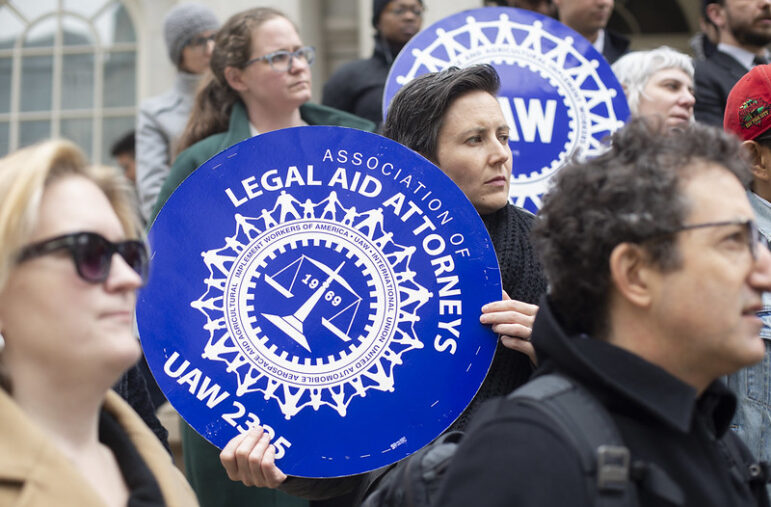
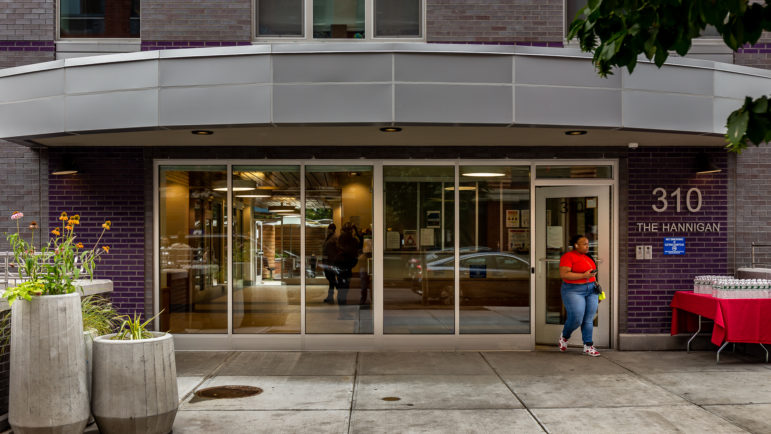


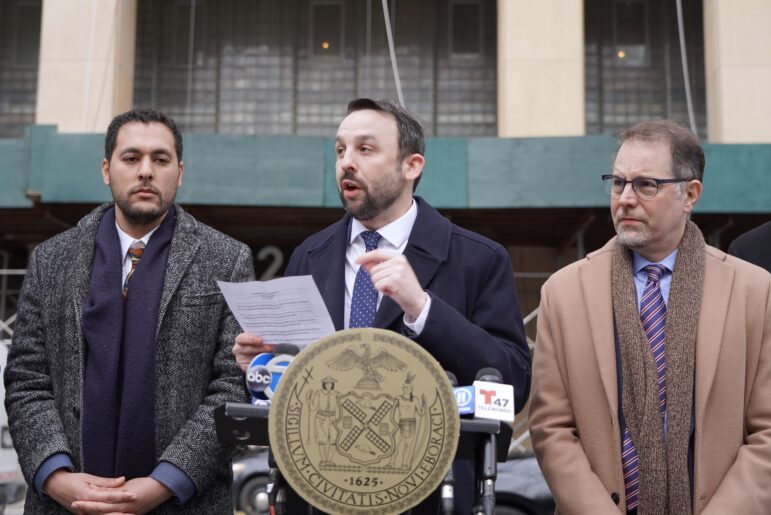


2 thoughts on “Late Session Goals Emerge As Housing Policy Fizzles Out of NY Budget”
You’re wasting your time pushing for Good Cause Eviction (GCE). It is unconstitutional because the government can’t force a private property owner to endlessly renew a lease on that private property against their will, and if private property owners loses control over how they rent out their private property that is a taking under the Constitution. Also if a private property is forced to renew leases, then who owns the property? The courts will throw our GCE for all the above reasons.
fix the affordable housing crisis by starting with reversing these on going market rate apartments at the Atlanticyards/pacificpark towers, that don’t help The people who marched for low income, moderate income, and senior apartment buildings, build truly affordable housing in park slope Brooklyn, there are plenty vacant lots and large ones they can hold many truly affordable housing for all, enough is enough, GET THINGS DONE, YES WE CAN, don’t that sounds familiar, BUILD BABY BUILD, every one deserve to live in a resourceful, safe neighborhood